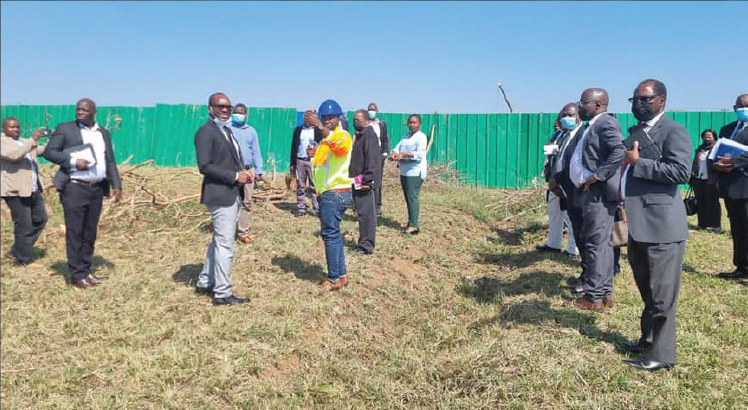Project to increase access in universities, colleges
At 6:30 pm, University of Malawi (Unima) students in Zomba used to take dinner. This was when they would look back at the day in their academic lives.
Today, it is no longer dinner time, but class time. The university extended its teaching hours from 7.00 am to 7:00 pm because of shortage of learning space.
This creates challenges for female students and learners with special needs who reside outside the campus as they have to walk to their residences under the cover of darkness.
However, all this will soon be a thing of the past as 1 900 students will be able to attend classes every hour in a teaching complex to be constructed at Unima. This will expand learning space under the World Bank-financed Skills for a Vibrant Economy (Save) project.

The $100 million (about K100 billion) project being implemented by the ministries of Education and Labour is aimed at providing skills development support through programmes offered in selected tertiary educational institutions. It ecompases higher education and technical, entrepreneurial and vocational education and training (Tevet). Special attention has been placed on demand-driven approaches to boost labour force skills, women’s empowerment, digital skills and technology, institutional strengthening and learning continuity.
Unima Save project coordinator Jonas Mwatseteza told members of the project technical committee lack of classroom space is one of the challenges to increasing access, particularly for female students and to develop programmes that are relevant to the labour market.
Unima is among nine higher education institutions and seven national technical colleges that will benefit from the project which started in 2021 up to 2026.
Other institutions are Mzuzu University, Mzuzu and Livingstonia technical colleges in the North; Namitete, Lilongwe and Salima technical colleges, Nalikule College of Education, Kamuzu University of Health Sciences and Lilongwe University of Agriculture and Natural Resources in the Centre.
In the South, Domasi College of Education, Malawi University of Business and Applied Sciences (Mubas), Malawi University of Science and Technology (Must), Kamuzu University of Health Sciences and Nasawa and Soche technical colleges will benefit.
Under the project, each institution has its unique set of plans for supporting the achievement of Malawi’s key strategic priorities in the education sector as outlined in the National Education Sector Investment Plan.
During recent visits by the Save Project Technical Committee and Project Steering Committee to selected universities and colleges, implementing institutions unveiled plans to prioritise access and reducing the constraints faced by female students in accessing tertiary education and ensuring a safe and conducive learning environment.
During a visit to Must, Secretary for Education Chikondano Mussa said the project has come at the right time when the country is implementing Malawi Vision 2063 which recognises human capital development as one of the seven enablers to realising Malawi’s aspirations by the year 2063.
“We have a duty to create a progressive citizenry that is capable of desiring, envisioning and constructing a future that is better and more inclusive through improved youth skills in line with Malawi 2063,” she said.
Must vice-chancellor Address Malata said her university was lacking in several areas, including infrastructure, to increase enrolment.
“We have the mandate to increase access to higher education, but we are being drawn back by limited capacity, especially on infrastructure. Fortunately, under the Save project, we have been given resources to build two 250-capacity lecture theatres in addition to the other areas of support within the project,” she said.
Just like Must, Mubas also has infrastructure development ambitions. The university is planning to construct a two-storey building hosting lecture rooms, a laboratory, a workshop, a design studio and an e-library at its satellite centre in Nanjiri in Lilongwe.
Mubas vice-chancellor Nancy Chitera said the building will be on the land the university procured in Lilongwe as part of its expansion drive beyond Blantyre.
“The new building will support increased access to skills development programmes in priority areas of the economy through face-to-face, blended and open, distance and e-learning instruction,” she said.
In Zomba, Domasi College of Education is planning to construct an open, distance and e-Learning centre on its campus. It is the type of teaching and learning centre that gives students affected by the barriers of distance, cost and time an opportunity to pursue studies online.
Acting principal for the centre Davies Mina said it will help in increasing access to teacher education in science, technology, engineering and mathematics subjects.
National technical colleges also have their aspirations under the project. Soche Technical College in Blantyre has set its eyes on constructing a two-storey building which will house classes and two modern automobile and fabrication workshops.
Project coordinator Stella Chirambo said two sites have been identified within the college’s campus. A visiting Save delegation encouraged the college to turn the workshops into maintenance centres for government vehicles.
On the other hand, Salima Technical College plans to construct a solar photovoltaic workshop, library and a 40-bed female hostel.
Over its five-year lifetime, the project will benefit about 45 000 university students and 65 000 technical and vocational students. It will establish partnerships with relevant industries and private sector entities to support skills development in priority areas, namely agriculture, education, energy, health, industry and ICT as well as updating courses and training of lecturers, professors and staff.





